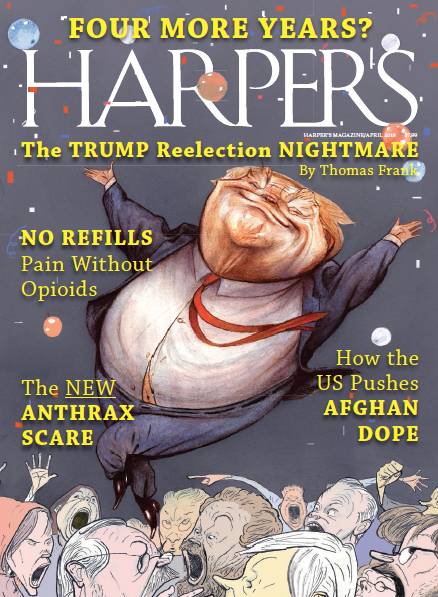Inside the April Issue
Thomas Frank, Elaine Blair, Andrew Cockburn, Lidija Haas, Corey Robin, and more...
 For many Americans, the thought of Donald Trump in the White House remains an exercise in surrealism. But how about the thought of a second term for one of the most reviled presidents in modern history? It’s not really such a stretch, argues Thomas Frank in “Four More Years.” For one thing, he notes, “men who are regarded as incompetent, callow, senile, or racist sail back into office, and are even canonized as heroic figures once they retreat into the postpresidential sunset, clearing brush or painting oil portraits.” All it would really take, Frank says, is steady wage growth—the natural outcome of a tight labor market and, perhaps, some shrewd infrastructure moves by the supposed blue-collar hero in the Oval Office. Can Democrats head off this dystopian scenario? Not, Frank insists, without ditching their finger-wagging obsession with Russia and reconfiguring themselves as the party of Roosevelt. “The time has come,” he writes. “History is calling.”
For many Americans, the thought of Donald Trump in the White House remains an exercise in surrealism. But how about the thought of a second term for one of the most reviled presidents in modern history? It’s not really such a stretch, argues Thomas Frank in “Four More Years.” For one thing, he notes, “men who are regarded as incompetent, callow, senile, or racist sail back into office, and are even canonized as heroic figures once they retreat into the postpresidential sunset, clearing brush or painting oil portraits.” All it would really take, Frank says, is steady wage growth—the natural outcome of a tight labor market and, perhaps, some shrewd infrastructure moves by the supposed blue-collar hero in the Oval Office. Can Democrats head off this dystopian scenario? Not, Frank insists, without ditching their finger-wagging obsession with Russia and reconfiguring themselves as the party of Roosevelt. “The time has come,” he writes. “History is calling.”
In “Mobbed Up,” Andrew Cockburn casts a cold eye on America’s sixteen-year-long involvement in Afghanistan. It’s not merely that the conflict is unwinnable—it’s that we’re caught in a turf war between rival drug gangs, and have been regularly played by one side, then the other. To put it another way, we are an unwitting enforcement arm of the international opium industry. In “The Pain Refugees,” meanwhile, Brian Goldstone explores another pharmacological conundrum: the opioid epidemic that is currently killing thousands of Americans per year. Goldstone doesn’t deny the damage done by these readily available painkillers. He does, however, argue that our efforts to ramp back and regulate the supply of opioids have left many legitimate patients in the lurch—and in chronic, terrifying pain.
Noah Sneider traveled to Russia’s frigid Yamal Peninsula to investigate a mysterious outbreak of anthrax, which killed thousands of reindeer and at least one human being (dozens more were seriously stricken and hospitalized). The culprit, it seems, is climate change. According to the so-called zombie theory, freakishly hot summers have melted great expanses of permafrost, opened giant sinkholes, and allowed long dormant anthrax spores to rise to the surface. On a more heartening note, Samanth Subramanian recounts the efforts of a tiny Scottish village to save its harbor from both dilapidation and garish overdevelopment. “A Port in a Storm” is a chronicle of small-town, tartan-inflected resistance, which may remind some readers of the 1983 film Local Hero. It is also an object lesson in the community shares model, a legal and fiscal tactic that has enabled other communities to keep their assets in local, non-predatory hands.
Colin Fleming delivers a compact, deeply touching work of fiction in “Find the Edges.” Elaine Blair explores the literature of workplace harassment, going all the way back to Samuel Richardson’s novel Pamela (1740), and Corey Robin delves into America’s national amnesia in this month’s Easy Chair. We have Lidija Haas on New Books and Christine Smallwood on the impossible task of motherhood. In Readings, we have a letter from Marina Tsvetaeva to Boris Pasternak, a style guide for white supremacists (“The more hyperbole, the better”), fiction by Patrick Chamoiseau, and a poem by Andrea Brady. There is, finally, a list of tasks performed by a former personal assistant of Harvey Weinstein that reveals the horrifying extent of the movie mogul’s routine sexual harassment. These range from the mundane (“Listening to his calls”) to the frankly icky (“Taking dictation of emails from him while he was naked”) to the apocalyptically gross (“Picking up his used condom”).



